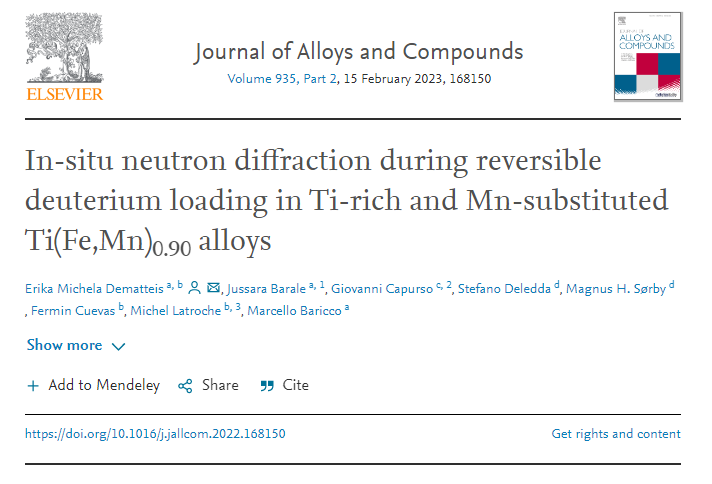New HyCARE scientific paper just released!

HyCARE’s researchers of the University Of Turin (Italy), the Centre National de la Recherche Scientifique (France), the Helmholtz-Zentrum hereon GmbH (Germany), together with the Institute for Energy Technology (Norway) published the results of the analysis of neutron diffraction data.
Abstract:
Hydrogen is an efficient energy carrier that can be produced from renewable sources, enabling the transition towards CO2-free energy. Hydrogen can be stored for a long period in the solid-state, with suitable alloys. Ti-rich TiFe0.90 compound exhibits a mild activation process for the first hydrogenation, and Ti(Fe,Mn)0.90 substituted alloys can lead to the fine tuning of equilibrium pressure as a function of the final application. In this study, the crystal structure of TiFe(0.90-x)Mnx alloys (x = 0, 0.05 and 0.10) and their deuterides has been determined by in-situ neutron diffraction, while recording Pressure-Composition Isotherms at room temperature. The investigation aims at analysing the influence of Mn for Fe substitution in Ti-rich Ti(Fe,Mn)0.90 alloys on structural properties during reversible deuterium loading, which is still unsolved and seldom explored. After activation, samples have been transferred into custom-made stainless-steel and aluminium alloy cells used for in-situ neutron diffraction experiments during deuterium loading at ILL and ISIS neutron facilities, respectively. The study enables remarkable understanding on hydrogen storage, basic structural knowledge, and support to the industrial application of TiFe-type alloys for integrated hydrogen tank in energy storage systems by determining the volume expansion during deuteration. Furthermore, the study demonstrates that different contents of Mn do not significantly change the volumetric expansion during phase transitions, affecting only the deuterium content for the γ phase and the cell evolution for the β phase. The study confirms that the deuterated structures of the γ phase upon absorption, β and α phase upon desorption, correspond to S.G. Cmmm, P2221 and Pm-3m, respectively.